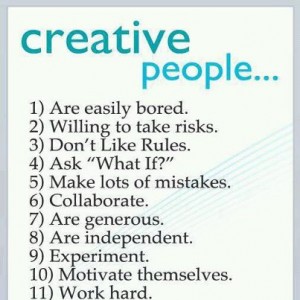I recently saw a posting on Facebook with a list of 11 qualities creative people possess or actions they tend to take. Number 2 on the list is “Willing to take risks”, number 9 is “Experiment” and number 5 is “Make lots of mistakes” . . . all of which are, of course, directly related. While I had to admit to all 11 (some happily and others ruefully), it was these three and their inter-relationship that jolted me out of a blue funk and back into a clarity.
“I have of late, and wherefore I know not, lost all my mirth”, to quote the Bard, and I personally cannot bear to be without it. I realized that at my core, I had somehow come to believe that the string of professional mistakes and face plants were a result of being a loser, and that each day from now until forever would be an unending continuation of the same. Enter said posting on Facebook. Creative people don’t just make mistakes (everyone makes mistakes); creative people make LOTS of mistakes. More so than other people. Why? Because they Number 5 (“Experiment”) and are Number 2 (“Willing to take risks”). Creative people must ask “What if” (Number 4) and then try new things, not simply because some new and wonderful outcome may happen, but also because creative people can’t help it. Occasionally, new and wonderful outcomes happen immediately, but more often, there are many mistakes and full-out face plants between “What if” and things that look like success. This isn’t just true for creative people but for anyone and everyone who wants to try a new skill, a new path, and new career trajectory, a new formula.
The problem is, full-out face plants hurt, mistakes are discouraging, and the fear of failure (especially repeated failure) can be crippling. Luckily, I subscribe to a free e-newsletter by a brilliant writer and editor, Hope Clark. She has commented on this as well, “This week several readers have given me pause, making me remember from whence I came and what I’ve learned. We read the blogs and newsletters from people who seem to be way over our heads in power, ability, and talent, and too often we discount our own abilities.”
After giving examples specific for writers, she closed with, “The underlying theme in all of these concerns and complaints is that of fear. Fear someone will make fun. Fear someone will steal our work or our money. Fear someone will take advantage of our deep-seeded, emotional urge to publish. We’re pouring our souls into print, and the last thing we need in the midst of our trepidation is someone who also robs us of money, rights or self-esteem. Do . . . it . . . once. Do an interview in person. Speak to a small group. Enter a contest. Let an editor lay hands on your work. What’s the worst that can happen? The interview goes badly? The host wants a good interview more than you do, trust me. The speech goes awry? You learn from it. The audience got no satisfaction from your trip-up. They were up there with you. So you lose the contest. So the editor doesn’t like your writing. You decide if you walk away unscathed. Not them.”
Whether we are writers, teachers, activists, artists, program directors, or accountants, it is still fear that prevents us from reaching out, from trying something new, still the emotional pain that makes us feel bad about who we are and what we are capable of doing or learning, and still decision to forge ahead and learn from the situation rather than be scarred by it.
So dream on, shine on, carry on, soldier on, walk on, you creative human—even the full face-plant creates new possibilities.
More about Hope Clark:
Hope Clark currently manages FundsforWriters.com, a weekly newsletter service she founded that reaches almost 50,000 writers to include university professors, professional journalists and published mystery authors. Writer’s Digest has recognized the site in its annual 101 Best Web Sites for Writers for a dozen years.
She’s published in The Writer Magazine, Writer’s Digest, Chicken Soup, Next Step Magazine, College Bound Teen, Voices of Youth Advocates (VOYA), TURF Magazine, Landscape Management and other trade and online publications. She speaks at several writers’ conferences a year and is the offer of the acclaimed novel Lowcountry Bribe. Hope is a long-term member of SC Writers Workshop Association, Sisters in Crime and MENSA.
